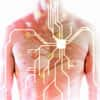
What's hot
What's hot
News flashes are posted here frequently to keep you up-to-date with the latest advances in health and longevity. We have an unparalleled track record of breaking stories about life extension advances.
- Anti-inflammatory mechanism found for metformin
- Vitamin D supplementation may lower diabetes risk in obese adolescents
- Trial finds brain benefit for DHA in young adults
- Antioxidant supplementation lowers oxidized LDL
- Research suggests coffee could be reason for Ikarian longevity
- Telomere length predicts coronary heart disease survival
- Vitamin D supplements lower BP in African-Americans
- N-acetylcysteine shows promise for schizophrenia
- SIRT1 confirmed as target for resveratrol and other compounds
- Omega-3 compound inhibits influenza virus
- Review summarizes benefits of CoQ10 supplementation
- Higher cysteine levels associated with reduced colorectal cancer risk
- Grape seed and skin protect kidneys against effects of high fat diet
Anti-inflammatory mechanism found for metformin
 March 29, 2013. In an article appearing on March 23, 2013 in the journal Aging Cell, researchers at the University of Montreal report that metformin, a drug used to treat diabetes, decreases the production of inflammatory cytokines which, when produced in excess, result in damaging inflammation that increases the risk of cancer and other diseases.
March 29, 2013. In an article appearing on March 23, 2013 in the journal Aging Cell, researchers at the University of Montreal report that metformin, a drug used to treat diabetes, decreases the production of inflammatory cytokines which, when produced in excess, result in damaging inflammation that increases the risk of cancer and other diseases.
Dr Gerardo Ferbeyre of the University’s department of biochemistry and his associates discovered that metformin inhibits the expression of genes that code for a number of inflammatory cytokines observed during cellular senescence. "Cells normally secrete these inflammatory cytokines when they need to mount an immune response to infection, but chronic production of these same cytokines can also cause cells to age,” Dr Ferbeyre explained. “Such chronic inflammation can be induced, for example by smoking."
"We were surprised by our finding that metformin could prevent the production of inflammatory cytokines by old cells."
The researchers uncovered evidence that metformin blocks the activity of a transcription factor known as nuclear factor kappa-beta (NF-kB), which is involved in inflammation. "The genes that code for cytokines are normal, but a protein that normally triggers their activation called NF-kB can't reach them in the cell nucleus in metformin treated cells", Dr Ferbeyre observed. "We also found that metformin does not exert its effects through a pathway commonly thought to mediate its antidiabetic effects."
"This is an important finding with implications for our understanding on how the normal organism defends itself from the threat of cancer and how a very common and safe drug may aid in treatment of some cancers and perhaps slow down the aging process,” he added. “It remains that determining the specific targets of metformin would give us an even better opportunity of profit from its beneficial effects. That's what we want to figure out next."
—D Dye
Vitamin D supplementation may lower diabetes risk in obese adolescents
 March 27, 2013. The April, 2013 issue of the American Journal of Clinical Nutrition published the results of a trial of adolescents which suggests that supplementing with vitamin D could lower the risk of developing diabetes.
March 27, 2013. The April, 2013 issue of the American Journal of Clinical Nutrition published the results of a trial of adolescents which suggests that supplementing with vitamin D could lower the risk of developing diabetes.
Thirty-five obese adolescents were randomized to receive a placebo or 4,000 international units (IU) vitamin D3 per day for six months. Blood samples obtained at the beginning of the study and at three and six months were analyzed for serum 25-hydroxyvitamin D, fasting glucose and insulin, and other factors.
While body mass index and glucose levels were similar between the two groups by the end of the trial, those who received the vitamin had significant increases in serum 25-hydroxyvitamin D as well as a reduction in fasting insulin. “By increasing vitamin D intake alone, we got a response that was nearly as powerful as what we have seen using a prescription drug,” stated lead researcher Catherine Peterson, who is an associate professor of nutrition and exercise physiology at the University of Missouri. “We saw a decrease in insulin levels, which means better glucose control, despite no changes in body weight, dietary intake or physical activity.”
“What makes vitamin D insufficiency different in obese individuals is that they process vitamin D about half as efficiently as normal-weight people,” she explained. “The vitamin gets stored in their fat tissues, which keeps it from being processed. This means obese individuals need to take in about twice as much vitamin D as their lean peers to maintain sufficient levels of vitamin D.”
“For clinicians, the main message from this research is to check the vitamin D status of their obese patients, because they’re likely to have insufficient amounts,” Dr Peterson noted. “Adding vitamin D supplements to their diets may be an effective addition to treating obesity and its associated insulin resistance.”
—D Dye
Trial finds brain benefit for DHA in young adults
 March 25, 2013. An article scheduled to appear in the May, 2013 issue of the American Journal of Clinical Nutrition reports the outcome of a clinical trial which found a benefit for the omega-3 fatty acid docosahexaenoic acid (DHA) on memory and reaction time in young, healthy men and women.
March 25, 2013. An article scheduled to appear in the May, 2013 issue of the American Journal of Clinical Nutrition reports the outcome of a clinical trial which found a benefit for the omega-3 fatty acid docosahexaenoic acid (DHA) on memory and reaction time in young, healthy men and women.
New Zealand researchers randomized 176 adults between the ages of 18 and 45 years to receive 1.16 grams DHA or a placebo daily for six months. Tests evaluating episodic and working memory, attention, reaction time of episodic and working memory, and attention and processing speed were administered before and after the treatment period.
At the end of the study, those who received DHA showed improvement in the reaction time of episodic and working memory. When the men and women in the study were separately analyzed, a significant improvement in episodic memory had occurred in women who received DHA and in the reaction time of working memory in men who received the compound.
“This study showed, for the first time to our knowledge, that DHA supplementation improved memory and reaction time of memory in healthy young adults whose habitual diet was low in DHA, and sex modulated the response,” the authors announce. “DHA supplementation significantly improved the reaction time of episodic memory, whereas the accuracy of episodic memory was improved in women, and the reaction time of working memory was improved in men.”
“These memory-related cognitive domains are the building blocks of more-complex cognitive functions or behaviors that are common in everyday life,” they conclude. “Thus, young healthy adults may cognitively benefit from an increased consumption of DHA.”
—D Dye
Antioxidant supplementation lowers oxidized LDL
 March 22, 2013. The July-August, 2012 issue of the Iranian Journal of Basic Medical Science published the results of a study conducted by researchers at Bushehr University of Medical Sciences in Iran which found a reduction in oxidized low-density lipoproteins (LDL) in men supplemented with antioxidant nutrients. Oxidized LDL plays a role in the development of atherosclerosis and increased coronary heart disease risk. Experimental evidence suggests that the administration of antioxidant compounds could help reduce LDL oxidation, thereby retarding the progression of atherosclerosis.
March 22, 2013. The July-August, 2012 issue of the Iranian Journal of Basic Medical Science published the results of a study conducted by researchers at Bushehr University of Medical Sciences in Iran which found a reduction in oxidized low-density lipoproteins (LDL) in men supplemented with antioxidant nutrients. Oxidized LDL plays a role in the development of atherosclerosis and increased coronary heart disease risk. Experimental evidence suggests that the administration of antioxidant compounds could help reduce LDL oxidation, thereby retarding the progression of atherosclerosis.
The study included two hundred men aged 40 and older with risk factors for cardiovascular disease that included hypertension, disordered lipids, type 2 diabetes, family history of premature cardiovascular disease, obesity and smoking. Participants were divided to receive one of the following five daily regimens for twelve weeks: 500 milligrams (mg) vitamin C, 400 international units (IU) vitamin E, 15 mg beta carotene, vitamins C and E plus beta carotene, or no supplements. Blood samples obtained prior to and after the treatment period were analyzed for plasma oxidized LDL, serum nutrient concentrations, blood glucose and lipids.
While oxidized LDL levels remained basically unchanged in the unsupplemented group, they declined in those who received separate or combined vitamin supplements. Those who received vitamin E experienced the greatest reduction, which averaged 24%.
“The findings of this study demonstrated that supplementation of antioxidant vitamins decreased harmful biomarkers for cardiovascular diseases such as oxidized LDL,” Saeid Najafpour Boushehri and coauthors conclude. “To reduce the risk of cardiovascular disease occurrence, the individuals at risk should be encouraged for a daily consumption of antioxidant vitamins supplementation.”
—D Dye
Research suggests coffee could be reason for Ikarian longevity
 March 20, 2013. An article published on March 18, 2013 in the journal Vascular Medicine suggests that the consumption of boiled coffee could be the reason for the exceptional longevity of residents of the Greek island Ikaria, which has a high percentage of long-lived individuals. While 0.1 percent of Europeans survive longer than 90 years, ten times as many inhabitants of Ikaria live to the age of 90 or older.
March 20, 2013. An article published on March 18, 2013 in the journal Vascular Medicine suggests that the consumption of boiled coffee could be the reason for the exceptional longevity of residents of the Greek island Ikaria, which has a high percentage of long-lived individuals. While 0.1 percent of Europeans survive longer than 90 years, ten times as many inhabitants of Ikaria live to the age of 90 or older.
The study included 142 residents of Ikaria aged 66 to 91. The participants underwent ultrasound assessment of flow-mediated dilation to assess endothelial function, a measure of cardiovascular health. Responses to dietary questionnaires were used to quantify coffee intake as low, moderate or high.
While flow mediated dilation increased with coffee intake, drinking boiled Greek coffee was associated with better endothelial function in comparison with drinking other types of coffee, even among subjects with hypertension. "Boiled Greek type of coffee, which is rich in polyphenols and antioxidants and contains only a moderate amount of caffeine, seems to gather benefits compared to other coffee beverages," lead researcher Gerasimos Siasos of the University of Athens Medical School explained.
“To our knowledge, there are no clinical studies evaluating the effects of chronic coffee consumption on endothelial function, especially in subjects with established cardiovascular risk factors such as elderly individuals,” the authors write.
“The present study provides evidence that chronic consumption of the boiled Greek type of coffee is associated with improved endothelial function in elderly individuals with an increased burden of cardiovascular risk factors,” they conclude. “Given the widespread use of coffee beverages across the world and the fact that even small health effects of coffee could have a large impact on public health, further studies are needed to document the exact beneficial mechanisms of coffee in vascular integrity.”
—D Dye
Telomere length predicts coronary heart disease survival
 March 18, 2013. The American College of Cardiology's Annual Scientific Session held in San Francisco March 9-11, 2013 was the site of a presentation of the finding of John Carlquist, PhD of Intermountain Medical Center of a correlation between longer telomeres and increased survival in people with heart disease. Telomeres are bits of DNA that cap the ends of chromosomes and protect them from damage.
March 18, 2013. The American College of Cardiology's Annual Scientific Session held in San Francisco March 9-11, 2013 was the site of a presentation of the finding of John Carlquist, PhD of Intermountain Medical Center of a correlation between longer telomeres and increased survival in people with heart disease. Telomeres are bits of DNA that cap the ends of chromosomes and protect them from damage.
“Chromosomes by their nature get shorter as we get older," explained Dr Carlquist, who is the director of the Intermountain Heart Institute Genetics Lab. "Once they become too short, they no longer function properly, signaling the end of life for the cell. And when cells reach this stage, the patient's risk for age-associated diseases increases dramatically."
The study utilized DNA obtained from over 3,500 individuals diagnosed with myocardial infarction or stroke, whose samples were part of an archive of close to 30,000 cardiac patients. The subjects were followed for up to 20 years, during which any deaths were recorded. "With so many samples and very complete electronic records, it's a unique resource," Dr Carlquist remarked.
"Our research shows that if we statistically adjust for age, patients with longer telomeres live longer, suggesting that telomere length is more than just a measure of age, but may also indicate the probability for survival,” he reported. “Longer telomere length directly correlates with the likelihood for a longer life—even for patients with heart disease.”
"I believe telomere length could be used in the future as a way to measure the effectiveness of heart care treatment," he predicted. "We can already test cholesterol and blood pressure of a patient to see how treatment is working, but this could give us a deeper view into how the treatment is affecting the body and whether or not the treatment is working."
—D Dye
Vitamin D supplements lower BP in African-Americans
 March 15, 2013. On March 13, 2013 in the American Heart Association journal Hypertension published the outcome of a trial conducted by Boston researchers which uncovered a reduction in blood pressure in association with vitamin D supplementation among African-American men and women, who have a significantly greater risk of hypertension in comparison with other groups.
March 15, 2013. On March 13, 2013 in the American Heart Association journal Hypertension published the outcome of a trial conducted by Boston researchers which uncovered a reduction in blood pressure in association with vitamin D supplementation among African-American men and women, who have a significantly greater risk of hypertension in comparison with other groups.
Two hundred eighty-three participants of an average age of 51 were randomized to receive 1000, 2000 or 4000 international units (IU) vitamin D3 or a placebo for three months during two consecutive winters. Blood pressure and plasma 25-hydroxyvitamin D levels were evaluated before and after treatment, and three months after the supplements were discontinued.
Plasma vitamin D levels rose correspondingly with increasing doses of vitamin D. While systolic blood pressure was higher by the end of the treatment periods among those who received the placebo, supplementation with vitamin D was associated with a decline in blood pressure that was greater among those that received higher doses of the vitamin. Among participants who received the highest dose of vitamin D, systolic blood pressure dropped by an average of 4.0 mmHg. Analysis of the data revealed a 0.2 mmHg average reduction in systolic pressure in association with every 1 nanogram per milliliter (ng/mL) increase in plasma vitamin D.
"This study may explain and help treat an important public health disparity," noted lead author John Forman, MD, who is affiliated with Brigham and Women’s Hospital’s Renal Division and Kidney Clinical Research Institute. "More research is needed, but these data may indicate that vitamin D supplementation lowers blood pressure in African-Americans."
"The gains were modest, but significant," he added. "If further research supports our finding, widespread use of vitamin D supplementation in African-Americans could have significant public health benefits."
—D Dye
N-acetylcysteine shows promise for schizophrenia
 March 13, 2013.The March 15, 2013 issue of the journal Biological Psychiatry reports the outcome of research conducted at the University of Lausanne in Switzerland which suggests a protective effect for N-acetylcysteine (NAC) against one of the causes of schizophrenia and depression.
March 13, 2013.The March 15, 2013 issue of the journal Biological Psychiatry reports the outcome of research conducted at the University of Lausanne in Switzerland which suggests a protective effect for N-acetylcysteine (NAC) against one of the causes of schizophrenia and depression.
In their introduction to the article, authors Kim Do and colleagues remark that dysfunction in a subtype of gamma-aminobutyric acid (GABA) transmitting neurons known as parvalbumin-expressing fast-spiking interneurons, which are involved in coordinating sensory and cognitive processing, is a hallmark of schizophrenia. To test their hypothesis that vulnerability to oxidative stress plays a role in the dysfunction of these neurons, the researchers studied mice bred with an impaired ability to synthesize the antioxidant compound glutathione. Animals that underwent stress during youth, which is considered a critical period for the development of schizophrenia, exhibited parvalbumin neuron impairment, yet those stressed during young adulthood showed no such effects. However, no impairment was observed in animals stressed during youth that were treated with N-acetylcysteine beginning before birth.
"These data highlight the need to develop novel therapeutic approaches based on antioxidant compounds such as N-acetylcysteine, which could be used preventively in young at-risk subjects," stated Dr Do of the University of Lausanne’s Center for Psychiatric Neurosciences. "To give an antioxidant from childhood on to carriers of a genetic vulnerability for schizophrenia could reduce the risk of emergence of the disease."
"This study raises the possibility that GABA neuronal deficits in psychiatric disorder may be preventable using a drug, N-acetylcysteine, which is quite safe to administer to humans," Biological Psychiatry editor Dr John Krystal affirmed.
—D Dye
SIRT1 confirmed as target for resveratrol and other compounds
 March 11, 2013. The March 8, 2013 issue of Science published an article by Harvard geneticist David Sinclair and colleagues which demonstrates that resveratrol and similar antiaging compounds under investigation work by targeting a single enzyme known as SIRT1. Activation of SIRT1, which occurs during calorie restriction and exercise, was previously reported to be the mechanism whereby antiaging compounds such as resveratrol exerted their effects; however, the research had recently been challenged by those who claimed there was insufficient proof of a causative relationship.
March 11, 2013. The March 8, 2013 issue of Science published an article by Harvard geneticist David Sinclair and colleagues which demonstrates that resveratrol and similar antiaging compounds under investigation work by targeting a single enzyme known as SIRT1. Activation of SIRT1, which occurs during calorie restriction and exercise, was previously reported to be the mechanism whereby antiaging compounds such as resveratrol exerted their effects; however, the research had recently been challenged by those who claimed there was insufficient proof of a causative relationship.
The current research demonstrated that 117 drugs affect SIRT1 via a common mechanism. “Ultimately, these drugs would treat one disease, but unlike drugs of today, they would prevent 20 others,” stated Dr Sinclair, who is also the head of the Lowy Cancer Research Centre’s Laboratory for Ageing Research at the University of New South Wales. “In effect, they would slow aging.”
He predicts that the first SIRT1-targeting drug will be marketed for those with diabetes. “Our drugs can mimic the benefits of diet and exercise, but there is no impact on weight,” he noted.
Dr Sinclair suggests that the compounds will one day be utilized as preventive measures rather than treatments for pre-existing conditions. “Now we are looking at whether there are benefits for those who are already healthy,” he reported. “Things there are also looking promising.”
“We’re finding that aging isn’t the irreversible affliction that we thought it was,” he added. “Some of us could live to 150, but we won’t get there without more research.”
—D Dye
Omega-3 compound inhibits influenza virus
 March 08, 2013. An article published online on March 7, 2013 in the journal Cell reports the discovery of Japanese researchers of an ability for protectin D1 (PD1), a compound occurring in the omega-3 polyunsaturated fatty acid DHA, to treat influenza infection in mice. Protectin D1 was found to be beneficial even at advanced stages of infection, during which antivirals are usually not effective.
March 08, 2013. An article published online on March 7, 2013 in the journal Cell reports the discovery of Japanese researchers of an ability for protectin D1 (PD1), a compound occurring in the omega-3 polyunsaturated fatty acid DHA, to treat influenza infection in mice. Protectin D1 was found to be beneficial even at advanced stages of infection, during which antivirals are usually not effective.
Preliminary research conducted by Yumiko Imai of Akita University and colleagues documented an ability of PD1 to inhibit the replication of H1N1 and H5N1 influenza viruses in human lung cells. Dr Imai’s team subsequently examined the lungs of mice that died of influenza and found a decrease in PD1 production.
When PD1 was given intravenously to mice 12 hours prior to and immediately after being infected with influenza, the animals experienced improved survival in comparison with those that did not receive the compound. Protectin D1 was also effective when given 48 hours after infection—a point in time when the administration of current anti-influenza drugs is not known to be effective. While PD1 or the antiviral peramivir administered two days after infection resulted in the survival of 25% to 30% of the mice, all of the infected animals survived when both treatments were given together.
"Given the potential for future lethal pandemics, effective drugs are needed for the treatment of severe influenza, such as that caused by H5N1 viruses," Dr Imai commented. "We have identified a novel therapeutic target for the treatment of severe influenza that is effective under conditions where known antiviral drugs fail to protect from death."
“Our findings suggest that PD1 could serve as a biomarker as well as a much needed antiviral drug for severe and lethal influenza virus infections," she concluded.
—D Dye
Review summarizes benefits of CoQ10 supplementation
 March 06, 2013. The March, 2013 issue of Nutrition Reviews published an article by Michael S. Pepper and his colleagues at the University of Pretoria in South Africa which provides an overview of coenzyme Q10 (CoQ10) supplementation in primary and secondary deficiency states. Primary CoQ10 deficiency occurs when the body's synthesis of this coenzyme is decreased due to mutations in specific enzymes involved in its production. Secondary deficiency is mainly observed among men and women who have been prescribed statin drugs which reduce a precursor in the pathway of CoQ10 synthesis, although there may be other causes.
March 06, 2013. The March, 2013 issue of Nutrition Reviews published an article by Michael S. Pepper and his colleagues at the University of Pretoria in South Africa which provides an overview of coenzyme Q10 (CoQ10) supplementation in primary and secondary deficiency states. Primary CoQ10 deficiency occurs when the body's synthesis of this coenzyme is decreased due to mutations in specific enzymes involved in its production. Secondary deficiency is mainly observed among men and women who have been prescribed statin drugs which reduce a precursor in the pathway of CoQ10 synthesis, although there may be other causes.
In their review, the authors describe the CoQ10’s benefits, including its antioxidant effect and its role in energy production and cell function. They note that CoQ10 has a remarkable safety profile as a supplement and has shown little in the way of adverse effects, which have not been observed to occur in greater frequency among those consuming relatively high doses in comparison with low doses. They add that no adverse effects have been demonstrated in association with amounts of up to 3,000 milligrams per day.
Supplementation is critical for those who are deficient in CoQ10, because of the minimal amount contributed by the diet. Although researchers do not yet agree upon routine supplementation to prevent adverse muscle events associated with statin-induced reductions in CoQ10, the authors of the review note that decreased coenzyme Q10 levels have been associated with consequences other than those that impact muscle, including an increased risk of mortality in heart failure patients. Monitoring patients who use statin drugs for plasma CoQ10 levels may be advisable, in addition to testing for a variation in a gene that is associated with statin intolerance.
”In patients in whom CoQ10 depletion is detected, appropriate supplementation should be administered at an optimal dose, using a formulation with proven superior bioavailability, to achieve normal plasma levels," the authors conclude. "In addition, a pharmacogenetic analysis may provide important information about the potential for statin-induced adverse effects in high-risk patients."
—D Dye
Higher cysteine levels associated with reduced colorectal cancer risk
 March 04, 2013. The results of a study reported online on February 20, 2013 in the American Journal of Clinical Nutrition reveal a protective effect for high blood levels of the amino acid cysteine against the risk of colorectal cancer (CRC). The study also found a greater risk of the disease among those with high levels of homocysteine, of which cysteine is a metabolic product.
March 04, 2013. The results of a study reported online on February 20, 2013 in the American Journal of Clinical Nutrition reveal a protective effect for high blood levels of the amino acid cysteine against the risk of colorectal cancer (CRC). The study also found a greater risk of the disease among those with high levels of homocysteine, of which cysteine is a metabolic product.
The current study included 988 women diagnosed with colorectal cancer over an average of 5.2 years of follow-up after enrolling in the Women’s Health Initiative Observational Study. The patients were matched for age, enrollment date and other factors with 988 control subjects. Blood samples collected upon enrollment between 1993 and 1998 were analyzed for cysteine, homocysteine and other factors.
For women whose cysteine levels were among the top 25 percent of participants, the risk of colorectal cancer was 43 percent lower than that of women whose cysteine levels were among the lowest 25 percent. For those whose homocysteine was among the top one-fourth of subjects at greater than 9.85 micromoles per liter, the risk of colorectal cancer was 46 percent higher in comparison with those whose levels were lowest at 6.74 micromoles per liter or less. In their discussion of the findings, Joshua W. Miller and colleagues remark that homocysteine plays a role in inflammation, which increases the risk of developing colorectal cancer and other conditions, whereas cysteine is a precursor for the intracellular antioxidant glutathione, which lowers oxidative stress that can be a cause of inflammation.
“To our knowledge, this is the largest study to date to assess longitudinal associations between homocysteine, cysteine, and CRC risk,” the authors write. “The results indicate that elevated homocysteine and low cysteine are risk factors for incident CRC. It remains to be determined if interventions targeted to decrease homocysteine and increase cysteine concentrations, such as B vitamin supplements, will reduce the risk of CRC.”
—D Dye
Grape seed and skin protect kidneys against effects of high fat diet
 March 01, 2013. An article published online on January 7, 2013 in the journal Applied Physiology, Nutrition, and Metabolism reveals the finding of Tunisian researchers of a protective effect for an extract of grape seed and skin against kidney dysfunction in rodents consuming a high fat diet.
March 01, 2013. An article published online on January 7, 2013 in the journal Applied Physiology, Nutrition, and Metabolism reveals the finding of Tunisian researchers of a protective effect for an extract of grape seed and skin against kidney dysfunction in rodents consuming a high fat diet.
In their introduction to the article, Kamel Charradi and associates note that while cellular lipid overload has been associated with the dysfunction of several organs, including the heart and liver, its effect on kidney function is less well understood. However, they remark that lipotoxicity-induced oxidative stress has been found to be involved in the development of a variety of kidney disorders.
The current research was intended to study the association between obesity-induced oxidative stress and kidney dysfunction, and to evaluate the potential protective properties of grape seed and skin extract. Twenty-four rats were divided to receive a high fat diet or standard diet for six weeks. The two groups were subdivided to receive a daily intraperitoneal injection of an extract of grape seed and skin or a control substance. At the end of the experiment, plasma samples were analyzed for indicators of kidney function, and the animals’ kidneys were examined for lipid content, oxidative stress and other factors.
Rats that received a high fat diet had increased kidney triglycerides and altered kidney function indicators linked to increased oxidative stress. These effects were reduced among those that received the grape seed/skin extract. The researchers suggest resveratrol, quercetin, catechins or unsaturated fatty acids as possible compounds in grape seed/skin extract that are responsible for the current study’s findings.
“The use of an antioxidant as grape seed skin extract could be beneficial in the prevention and treatment of high fat diet-induced kidney disturbances,” they conclude.
—D Dye
